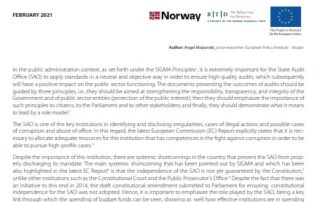Publications
Transparency across public administration reform in Serbia: An underachieved priority
According to the Organisation for Economic Cooperation and Development [...]
Weak mechanisms for improving service accessibility for disadvantaged groups
The process of adjusting and improving accessibility to public [...]
Government-citizen relations in Bosnia and Herzegovina: Representation through policy-making process
Despite being a central part of the executive bodies, [...]
Addressing the lack of open data in Bosnia and Herzegovina
Open data refers to public sector information or government [...]
Publishing information on the public service in North Macedonia
In North Macedonia, the public has to be informed [...]
The role and potentials of the SAO in improving transparency, accountability, and efficiency of institutions
In the public administration context, as set forth under [...]
Accountability – a vital prerequisite for public authorities
Accountability is a precondition for public authorities in order [...]
Politicization risks in Albania’s civil service
The professional integrity of the civil service remains a [...]
Ticking the box on public consultations
A transparent approach to consultation processes, inclusive of civil [...]
Flawed policymaking in Albania
One of the critical dimensions of the public administration [...]
Public consultations and policymaking in Serbia
Being part of the wider public administration reform (PAR), [...]
Public engagement in developing key strategic public administration reform (PAR) documents
Consultation is structured public engagement, which involves seeking, receiving, [...]
Public service and human resources management
Developed democracies as a rule boast professional, largely apolitical [...]
Addressing the lack of open data in Bosnia and Herzegovina
Open data refers to public sector information or government [...]
Scarce early consultations in Kosovo
As part of its commitment to democratic governance and [...]
Proactive transparency and the right of access to information
Proactive transparency and free access to information characterize democratic [...]

















